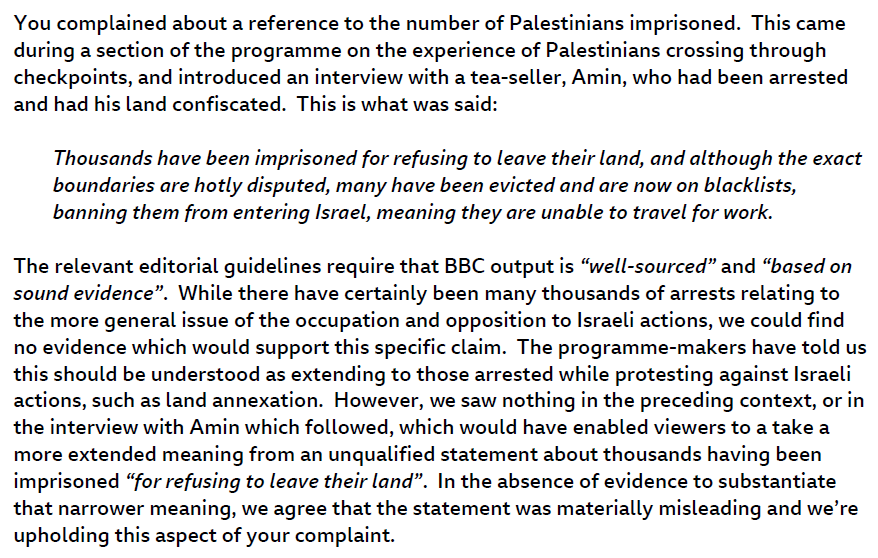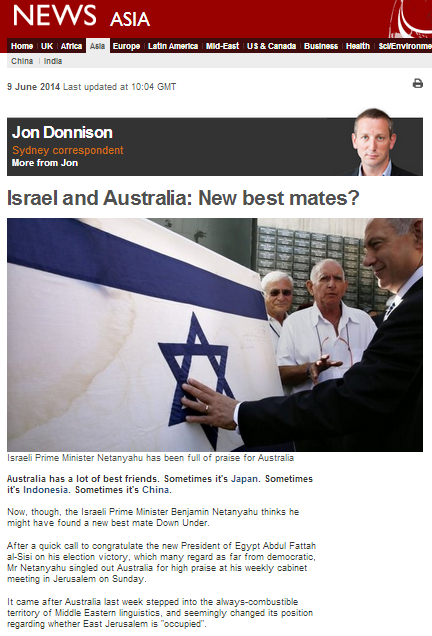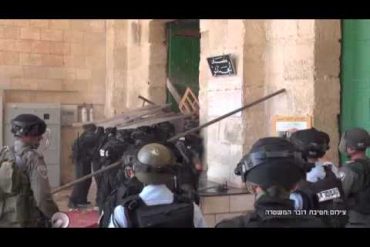Readers no doubt recall that in December 2017 the BBC’s Christmas season programming included a programme commissioned for BBC Two titled ‘Alternativity’.
Contrary to prior claims from the station’s controller Patrick Holland, the programme did not present “a challenging and provocative exploration” of the nativity story at all. Rather, most of the hour-long programme was devoted to context-lite, one-sided political messaging relating to Israel promoted from both its narrator (actress Olivia Colman) and its main character Danny Boyle.
Political narrative and inaccuracy in BBC Two’s ‘Alternativity’ – part one
Political narrative and inaccuracy in BBC Two’s ‘Alternativity’ – part two
BBC Watch submitted a complaint concerning ‘Alternativity’ which, because of the word-count restrictions on complaints, focused on just three aspects of the programme.
Over six months later the BBC’s Executive Complaints Unit (ECU) has upheld one of the points made by BBC Watch and rejected two additional points. As readers may know, the first two stages of the BBC complaints procedure are outsourced to a private company and it is hence interesting to take a look at the responses received at those first two stages on a point that was eventually upheld.
The first point we raised in our initial complaint referred to a claim made by the narrator at 12:20 minutes into the programme.
Colman: “The separation barrier and the Israeli occupation of Palestinian land have sliced through communities, separating neighbours. Thousands have been imprisoned for refusing to leave their land and although the exact boundaries are hotly disputed, many have been evicted and are now on black-lists banning them from entering Israel, meaning they are unable to travel for work. One of these is Amin. Imprisoned as a teenager, he now makes his living selling refreshments to the workers.” [emphasis added]
We argued that the highlighted claim is untrue. The response we received at stage 1a was as follows:
“Figures on the number of arrests, prosecutions or convictions directly related to the refusal of Palestinians to leave land which has been seized or confiscated by Israel are unavailable, but the claim that “thousands have been imprisoned for refusing to leave their land” is conservative given the scale of the confiscation, annexation and enclosure of Palestinian land, as well as the widespread and systemic scale of arrest and detention without charge or trial (known as administrative detention).”
We submitted a second complaint – Stage 1b – on January 22nd 2018:
“While admitting that the BBC does not have facts and figures, the response claims that the claim “thousands have been imprisoned for refusing to leave their land” is none the less accurate. Unless the BBC can produce concrete examples of people “imprisoned for refusing to leave their land” that claim cannot be considered accurate. The original claim related to land used for construction of the anti-terrorist fence and owners of such land are not only compensated but are entitled to appeal to the Israeli courts.”
Notably, the response we received to that point in our second complaint relied primarily on information sourced from the foreign-funded political NGO B’tselem and the PFLP linked group Addameer.
“The BBC has an obligation towards achieving “due accuracy”. Our Editorial Guidelines say “Accuracy is not simply a matter of getting facts right. If an issue is controversial, relevant opinions as well as facts may need to be considered. When necessary, all the relevant facts and information should also be weighed to get at the truth.” As we are sure you are aware, the Israeli government does not publish the numbers of individuals subject to what it calls “administrative detention”, nor the reasons why those individuals have been detained (as detailed here www.btselem.org/administrative_detention). But there is a significant amount of information – what the Guideline is referring to when it uses the terms “relevant opinions”, and “relevant facts and information” – that can be analysed to provide a reasonable estimate. For example, it is reliably reported that around 100,000 Palestinians have been held in administrative detention over the years.
You note that Palestinians whose land has been appropriated for construction of the barrier are compensated. But that has no bearing on the issue of how the Israeli authorities dealt with protests against the barrier’s construction. There have been many such protests, with Addameer documenting at least 295 cases of Palestinians detained for protests against barrier construction and land annexation in 2011 alone. So it is quite clear that numerous Palestinians have been imprisoned for refusing to leave their land.
The next question is therefore whether “thousands” is a reasonable estimate for the numbers detained. As noted above, there is evidence that there were 295 in 2011 alone, by which time a great deal of the barrier in the West bank had already been completed. The correct shorthand expression for 2011 alone would be “hundreds”. But Israel started construction in 2002, and it is not yet finished. It therefore seems reasonable to conclude that, over a fifteen year period, the total number detained is most likely to be in the thousands.”
Having exhausted stages 1a and 1b of the BBC complaints procedure, we continued with a complaint submitted on February 28th 2018 to the Executive Complaints Unit after having consulted the former IDF Chief Prosecutor in Judea & Samaria, Lt. Col. Maurice Hirsch (at the time senior military justice consultant for NGO Monitor) who, inter alia, pointed out that:
“To the best of my knowledge, as someone intimately involved in law enforcement in Judea and Samaria for 20 years, no Palestinian has been imprisoned for “refusing to leave their land”! That claim is simply a fiction. Firstly, most (approximately 95%) Palestinians resident in Judea and Samaria live in the large Palestinian towns and the surrounding villages. With the exception of one, none of these towns are affected by the security barrier. Secondly, “refusing to leave your land” is not an offence, and consequently no one has been arrested or imprisoned on this basis. Thirdly, Palestinians separated from their land by the security barrier are entitled to and are in practice given permits to access their land.”
With regard to the claim in the BBC’s response that ““thousands have been imprisoned for refusing to leave their land” is conservative given the scale of the confiscation, annexation and enclosure of Palestinian land, as well as the widespread and systemic scale of arrest and detention without charge or trial (known as administrative detention)”, Lt. Col. Hirsch noted that:
“As regards Administrative detention the BBC intentionally combines two subjects that have no connection whatsoever. According to international law (art. 78 of the Fourth Geneva Convention) a person can only be placed in administrative detention, if it is necessary for “imperative reasons of security”. No Palestinian has been placed in administrative detention for “refusing to leave their land”. According to precedent set down by Israel’s Supreme Court, a person can only be placed in administrative detention if the state proves that he poses an imminent, severe danger to the security of the public. It should be noted, that while the judicial review process of Administrative detention orders carried out by the military courts far extends the requirements of international law, Palestinians also have the right to challenge their administrative detention before Israel’s supreme court.”
With regard to the claim in the BBC’s response that “For example, it is reliably reported that around 100,000 Palestinians have been held in administrative detention over the years…as detailed here www.btselem.org/administrative_detention“, Lt. Col. Hirsch noted that:
“There is nothing ‘reliable’ about the report that 100,000 Palestinians have been held in Administrative detention. The occurrence of administrative detention between the years 1967 – 1987 was very limited. In response to the Palestinian terrorism that started in 1987 the use of administrative detention increased. With the onset of the Oslo Accords, Israel’s use of administrative detention waned. Only in 2001, as a response to the wide scale Palestinian terrorist attacks, did Israel revert to the use of administrative detention. Since then, the number of Palestinians arrested in administrative detention has fluctuated considerably. According to publicly available documents, that organisations like B’tselem chose to ignore, in the 20 year period, between 1995 and 2015, 16,041. In that period, in one year (2000) only 17 new administrative detention orders were issued. In another year (2002) 2,578 new orders were issued. In other words, if one were to use the 20 years between 1995 and 2015 as a basis, it would indicate that Israel placed 800 Palestinians a year in administrative detention. Assuming that these figures are automatically reflective of the statistics since 1967, the result would be that 40,000 Palestinians have been held in administrative detention. Having said that, noting the tremendous fluctuation in the use of administrative detention, any statistic given, that is not based on official numbers for every year, is inherently unreliable.”
In response to the claim in the BBC’s reply “…with Addameer documenting at least 295 cases of Palestinians detained for protests against barrier construction and land annexation in 2011 alone. So it is quite clear that numerous Palestinians have been imprisoned for refusing to leave their land”, Lt. Col Hirsch noted that:
“There is no logical connection between these two statements. Palestinians “detained for protests against the barrier… and land annexation” include those who threw stones, molotov cocktails and committed other related offences. The arrest of these people had nothing to do with “refusing to leave their land”, but rather the fact that they committed violent offences. Moreover, considering the fact that demonstrations against the construction of the security barrier were organized by the Palestinian Authority and called for widespread participation, it is also factually inaccurate to assume that all those arrested were necessarily the owners of the land on which they were arrested.”
In response to the claim in the BBC’s reply “there is evidence that there were 295 in 2011 alone, by which time a great deal of the barrier in the West bank had already been completed. The correct shorthand expression for 2011 alone would be “hundreds”. But Israel started construction in 2002, and it is not yet finished. It therefore seems reasonable to conclude that, over a fifteen year period, the total number detained is most likely to be in the thousands”, Lt. Col. Hirsch noted that:
“…there is no logical or statistical basis to use a statistic for the prevalence of law enforcement in one year alone in order to ‘calculate’ a larger figure for multiple years. For example in 2006, a total of 1120 Palestinians were prosecuted for offences categorized as “Disturbances of the peace” (as opposed to Terrorism; Regular criminal offences; and Illegal entry into Israel). That number decreased in 2008 to only 593. This category included, among other offences, stone throwing. Accordingly, this simplistic statistical approach adopted by the BBC ignores the tremendous fluctuation in law enforcement every year.”
Four months after that complaint to the ECU had been submitted, we received a reply which includes the following:

According to further communication with the ECU, that finding “will be published in due course on the complaints pages of bbc.co.uk“. BBC Watch does not know what the BBC considers to be “due course” after it has taken over six months for a point rejected at stages 1a and 1b to be upheld by the ECU.
In part two of this post we will look at some of the interesting responses received from BBC Complaints in relation to the other two points raised in this complaint.
Related Articles:
How the BBC outsources its complaints system
Political narrative and inaccuracy in BBC Two’s ‘Alternativity’ – part one
Political narrative and inaccuracy in BBC Two’s ‘Alternativity’ – part two




